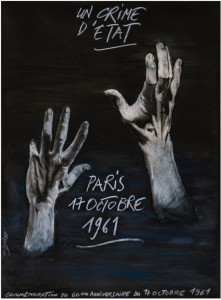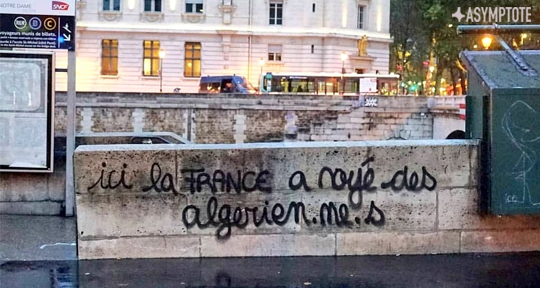This essay is written in memory of all those—predominantly Algerian—killed, deported, or otherwise injured by the violences of French colonialism, and in solidarity with the continuing efforts to resist the forgetting of October 17, 1961 and demand accountability from the French state.
For most of the English-speaking world, October 17 will not register as a date of any consequence. Yet, several days ago in the boulevards of Paris, scores of demonstrators marched from the Rex Cinema to the Pont Saint-Michel; they were tracing, in a defiant act of memory, the cartography of a heinous massacre of Algerian protestors by the French police force that took place, sixty years prior on the very same cobblestones. Their ancestors—most of whom did not survive that deadly evening—had walked those roads in peaceful opposition to the racism and surveillance they had suffered at the hands of the French, as well as the discriminatory night-time curfew that had just been imposed exclusively on Algerian workers.
The publicity posters of this year’s commemorative efforts feature the title “Un Crime d’État” (a crime of the state), handwritten in a ghostly chalk-like texture above two shadowed hands reaching out of murky, watery depths. To the survivors, descendants, relatives, historians, activists, and those who otherwise refuse to forget the bloody police brutality of October 17, 1961, that tableau of desperation will be familiar. On that night, besides beating and injuring countless men, French police officers handcuffed and threw an undocumented number of Algerian demonstrators into the river Seine, leaving them to drown. Historians estimate that around two hundred deaths occurred that night. In an eyewitness account cited in House and MacMaster’s monumental Paris 1961: Algerians, State Terror, and Memory, officers throttled the arms of a man clinging to the parapet “until he dropped like a stone into the river.” Subsequently, nearly six thousand Algerians who did not perish were rounded up, tortured, and deported back to detention camps in Algeria.
Of the scant images that have circulated of 1961, the most iconic is arguably a shot of graffiti spray-painted along the riverbanks, reading “Ici on noie les Algériens” (here we drown Algerians). What’s remarkable is its persistent afterlife in the infinitely reproducible medium of photography, elevated to a sort of metonym for Algerians’ collective trauma—despite the actual graffiti having been literally whitewashed out of existence not long after its writing. Street art continues to spring up here and there: a telling instance is “Ici la France a noyé des Algérien(nes)” (here France drowned Algerians), shifting the temporal frame of reference and naming the locus of guilt. Or, more recently: “Nous sommes les descendants des algériens que vous n’avez pas noyé . . .” (we are the descendants of the Algerians that you did not drown).

The state’s erasure of the incriminating graffiti emblematises an essential hypocrisy upon which France’s modernity is built, and perhaps no colony has borne the brunt more painfully than Algeria. It was there, during its struggle for independence from 1954 to 1962, that the French government engaged in one of its most violent and cruel wars while native peoples agitated for decolonisation. Yet the metropolitan French press, largely indifferent to what was transpiring across the Mediterranean, referred to the widespread killings, bombardments, and torture euphemistically as “the events.” Only in 1999—a full thirty-seven years after Algeria gained independence—did France officially bring itself to acknowledge that a “war” had occurred. READ MORE…


Compass and Rifle: On Roque Dalton’s Stories and Poems of a Class Struggle
No one escapes Dalton’s inquisitive pen . . .
Stories and Poems of a Class Struggle by Roque Dalton, translated from the Spanish by Jack Hirschman, Seven Stories Press, 2023
On Thursday, July 6, 2023, the inaugural day of Guatemala’s International Book Fair (FILGUA), the government of El Salvador requested organizers to exclude Salvadoran author Michelle Recinos’ Sustancia de hígado (F&G Editores) from the fair. The next day, online news outlet elfaro revealed that El Salvador’s ambassador in Guatemala had said, “It would’ve been an unpleasant thing for the government of El Salvador if this book had been a part of the fair.” Details are scarce, but presumably, this action was related to Michelle’s story Barberos en huelga, winner of the 2022 Mario Monteforte Toledo Prize, which openly criticizes sitting president Nayib Bukele’s war on gangs.
Hearing this, I can only imagine what Roque Dalton would have written about Bukele.
Roque Dalton’s Historias y poemas de una lucha de clases (Stories and Poems of a Class Struggle) dates back to 1975, and remains as timely as ever. In a time when most Central American countries are under authoritarian regimes and have experienced backslides of democracy, the life and work of Roque Dalton is at once a beacon of hope, an inspiration, and a warning sign. Historias y poemas de una lucha de clases is a book filled with courageous testimony, the poet’s typical dry humor, and bone-chilling depictions of state violence. Here, Dalton is hyperaware of the pain and plight of his compatriots, but in addition to his typical grittiness and social critique, we also find tenderness, softness, beauty, and frailty; Dalton’s acute perception is both a rifle and a compass, manifesting in words of both rebuke and encouragement.
READ MORE…
Contributor:- José García Escobar
; Language: - Spanish
; Place: - El Salvador
; Writers: - Alaíde Foppa
, - Carlos Fonseca
, - Ernesto Cardenal
, - Jack Hirschman
, - Jaime Barba
, - Julio Delfos Marín
, - Luis de Lión
, - Luis Melgar Brizuela
, - Margaret Randall
, - Michelle Recinos
, - Otto René Castillo
, - Roque Dalton
; Tags: - authoritarianism
, - Central American literature
, - class struggle
, - elfaro
, - F&G Editores
, - fascism
, - FILGUA
, - Mario Monteforte Toledo Prize
, - Salvadoran literature
, - Salvadoran poetry
, - Seven Stories Press
, - social commentary
, - social critique
, - state violence